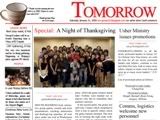Two and a half centuries ago a stormy dispute surged through the Christian world about the nature of China’s culture. In Rome, the Catholic Church was deeply divided over the nature of Chinese culture. Did the ancient Chinese, long before they encountered Buddhism, Christianity, or Islam, have an understanding of God in a monotheistic sense as creator and sustainer of the universe?
Matteo Riccia Jesuit, Bible Scholar, Missionary, Scientist, Mathematician who was multi-talented and well versed in the reading, writing and speaking of ancient chinese
The Jesuits, who had an intellectually brilliant and profound impact on China in the seventeenth and eighteenth centuries, thought they did. So, two centuries later, did Rev. James Legge, translator of the Chinese classics into English and a deep admirer of Confucius. But in the eighteenth century, Dominican and Franciscan opponents of the Jesuits, who distrusted the confident Jesuit influence within the Chinese imperial court, disagreed noisily. Ancient Chinese beliefs, they said, were so many pagan superstitions, and needed to be discarded by prospective Chinese converts to Catholicism. Legge’s opponents took the same position, and were only partially deflected in their opposition to his views because the Scottish clergyman was so brilliant that he became Oxford University’s first professor of Chinese.
The “Rites Controversy” in the Catholic Church was so destructive that it caused the Chinese emperor himself to shut down all Christian activities in China in disgust. Catholics who had been granted total freedom to teach and convert in 1691 were by 1722 being hounded out of China. At issue was the question whether Chinese traditional veneration of ancestors was a form of “worship,” or was merely an affirmation of respect for them. Many have speculated how different China’s modern history might have been if China’s greatest emperor, Kang Xi, had been won over to the Christian faith instead of being driven to exasperation by Vatican pettiness.
Chan Kei Thong, a Singaporean Chinese Christian resident in Beijing, and co-author Charlene L. Fu, a former Associated Press reporter in the Chinese capital, have re-examined the issue of China’s cultural origins and come to a powerful conclusion. Not only did the ancient Chinese worship Almighty God (shang di, in the Chinese), they say, but also, in Thong’s words, “striking similarities exist[ed] between the Hebrew and the Chinese approach to moral truth.”

“I have become convinced,” Thong, the president of Leadership Development International, a management consulting firm, writes in his personal introductory chapter, “that the ancient Chinese worshipped the Creator of the Universe in a manner similar to that prescribed in the Old Testament.” Thong’s evidence for this statement, skillfully articulated by Fu, lies in three main sources: the root meaning of many Chinese characters, the references to shang di in the Chinese literary classics, and the elaborate religious ceremony practiced by all eighteen Chinese dynasties called the “border sacrifice.” In the case of the third source, one of Beijing’s most beautiful and famous architectural monuments, the Temple of Heaven, was the site of the “border sacrifice,” an elaborate annual ceremony on the winter solstice, right up to the collapse of imperial rule in China in 1911. In the ceremony, the emperor, who had fasted for three days and was reverentially humble in demeanor, bowed before an altar in recognition of his—and China’s—compact with shang di. In fact, the correct translation of tian tan, the Chinese name for the monument, is “Altar of Heaven.” The building is in no way a religious temple in the manner, say, of a Buddhist or Taoist Chinese temple. For one thing, there are no statues or idols in it.
Thong and Fu skillfully make the point that the Chinese classics are filled with symbolic signposts to shang di as a creator deity who watched over the affairs of humankind and whose moral favor needed to be carefully placated. In fact, the Confucian emphasis on the “virtue” of rulers as the Chinese sine qua non of good government derives from a Confucian understanding of humanity’s moral obligation to the divine. Confucius himself, in his introduction to one of the Chinese classics, the Yi Jing (“Book of Changes”), said that the purpose of this classic was to help people “pursue an exhaustive understanding of the universe in order to do God’s will.”

Many Sinologues might be curious about this dispute, but the pathway that Thong took to write the book was not academic. A student atheist who became a Christian in college in Singapore, Thong says that it wasn’t until 1996 that he realized during a visit to the Temple of Heaven that whatever had been worshiped there originally wasn’t a pagan idol, because there wasn’t a single idol throughout the Temple area. His motivation to begin the research that led to the book, however, derived from his sense of sadness at a common Chinese misperception—common even today—that Christianity is a “Western” religion and that “God” is a Western concept. As a devout Christian of Chinese ancestry, he had probably heard about the dismissive nineteenth- and twentieth-century references of many Chinese towards Christianity: “One more Christian, one less Chinese.”
Although the book was written in English, a Chinese translation was published first for Chinese readers, whom Thong wanted to convince that Christianity was entirely compatible with ancient Chinese thought and the deepest roots of Chinese culture. Startlingly, an official Chinese publishing house in China agreed to publish the book in Chinese, then later, in English. The English version is a handsomely illustrated and laid-out volume, complete with time-lines of world, Hebrew, and Chinese history, a bibliography, and high quality color photographs of Chinese cultural objects that, Thong believes, give support to his thesis.
Western secular Sinologists have traditionally paid scant attention to the monotheistic component of traditional Chinese culture. They, and Chinese scholars, may also not be as convinced as Thong is that the characters in China’s ancient writing system contain symbolic leftovers of moral concepts familiar from Biblical times. But evidence that China manifestly believed in a sustaining, creator God with moral attributes very similar to those of ancient Israel’s Yahweh are hard to dispute. Even harder to dismiss is the sense that the Chinese emperors inherited an understanding that each of them acted as the “Son of Heaven” in ruling China and owed a regular accountability to a force infinitely above themselves: shang di, or the often-used synonym tian (“heaven”).
The question arises therefore, if the ancient Chinese worshiped God, why did they depart from that practice and admit a pantheon of Buddhist and Taoist deities in the course of their long history? Thong and Fu argue that the plethora of lesser deities arose during a turbulent period of China’s history, the so-called Warring States period (475–221 BC). At that point, China also became enamored of the dragon, says Thong, and worship of the creator became worship of the creature. It was downhill from then onwards in China’s cosmology, the authors argue.
.jpg)






No comments:
Post a Comment